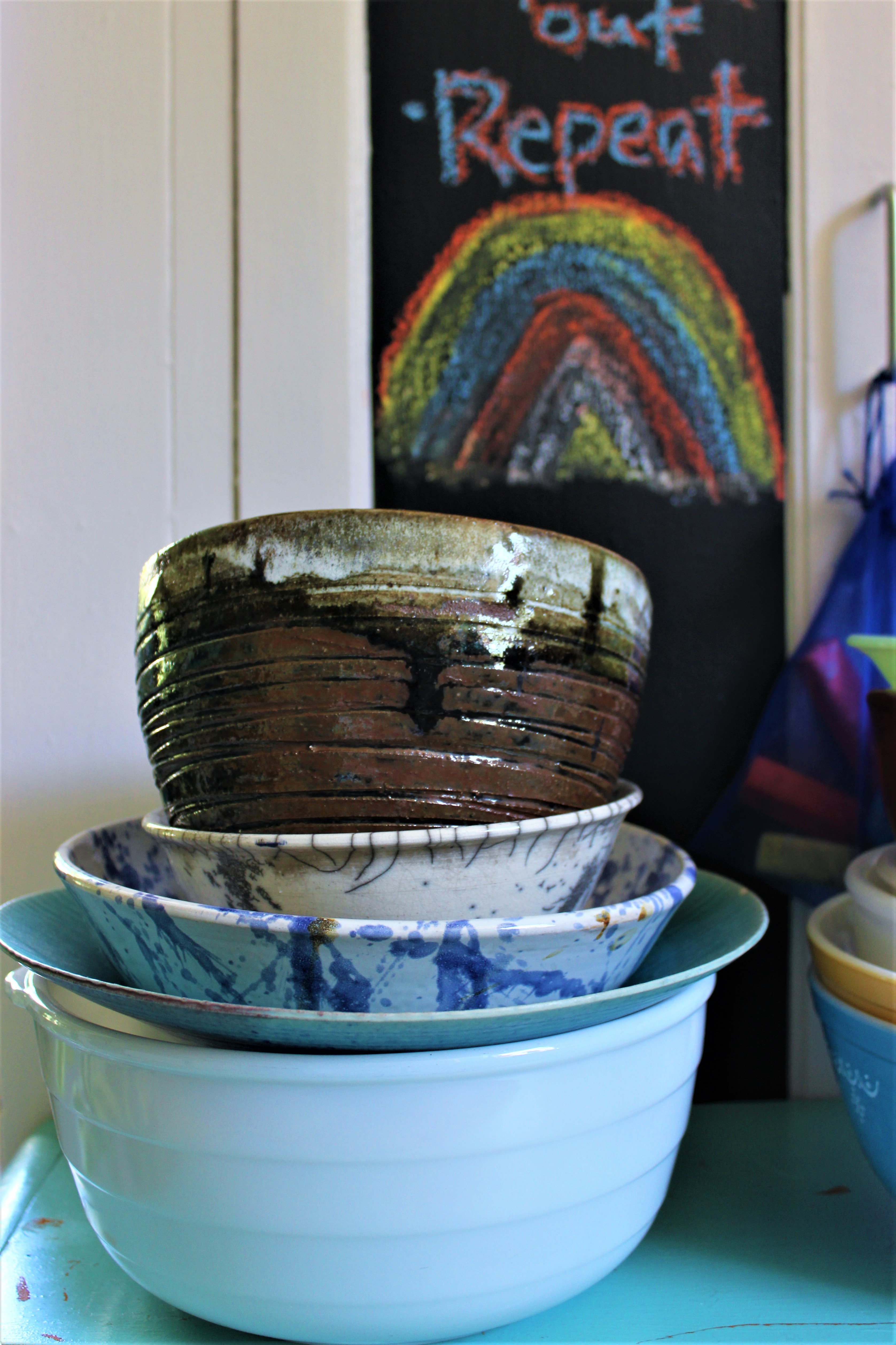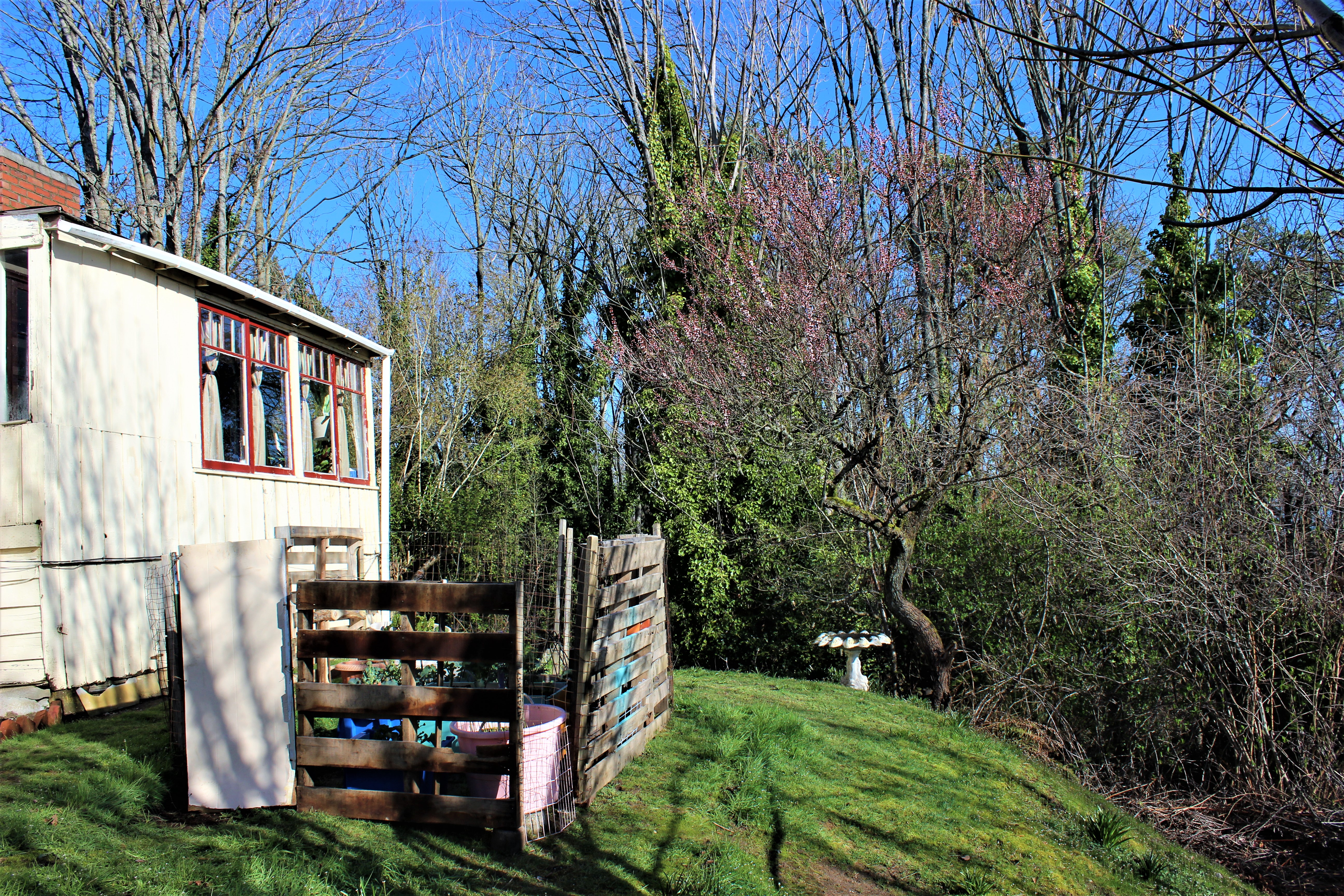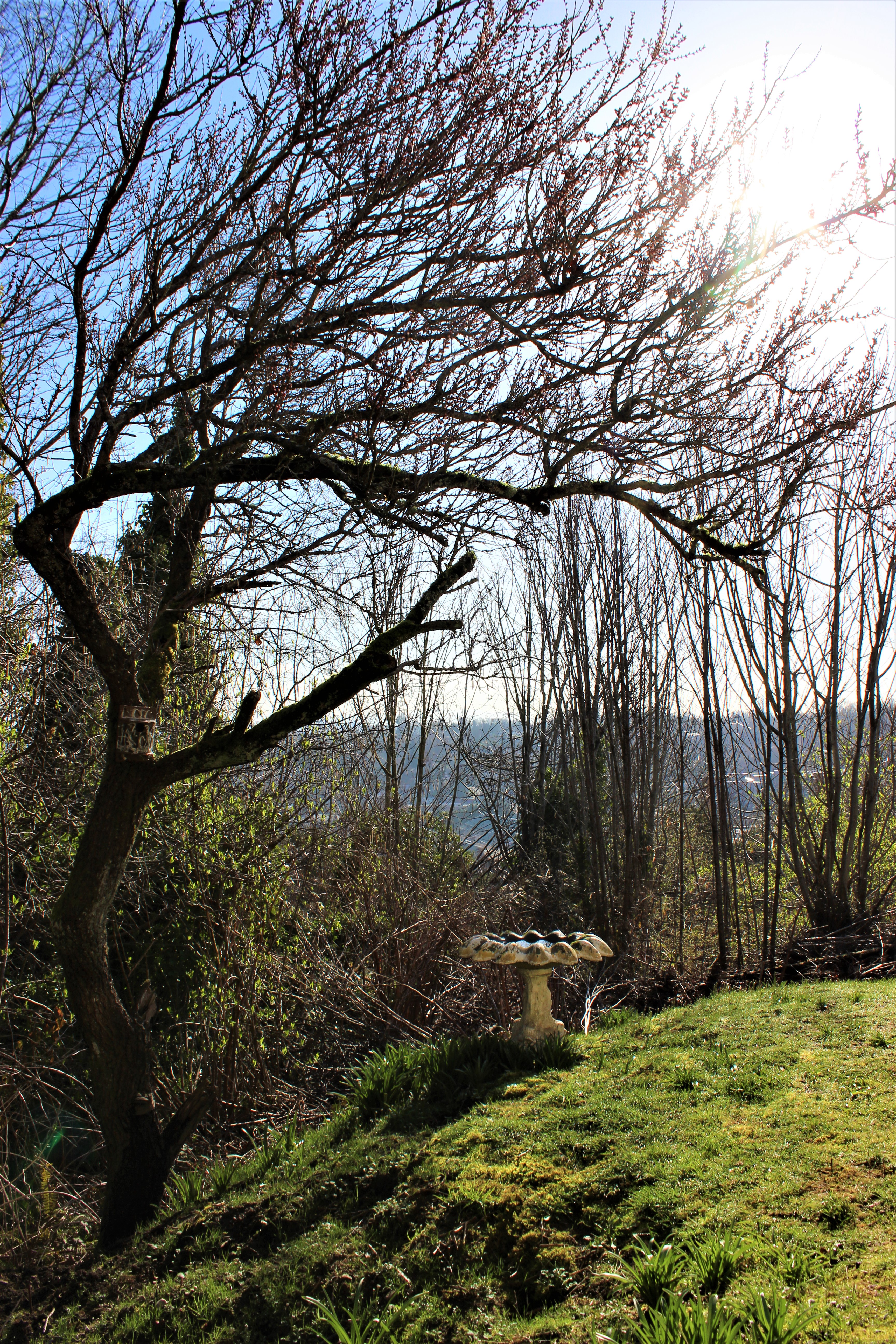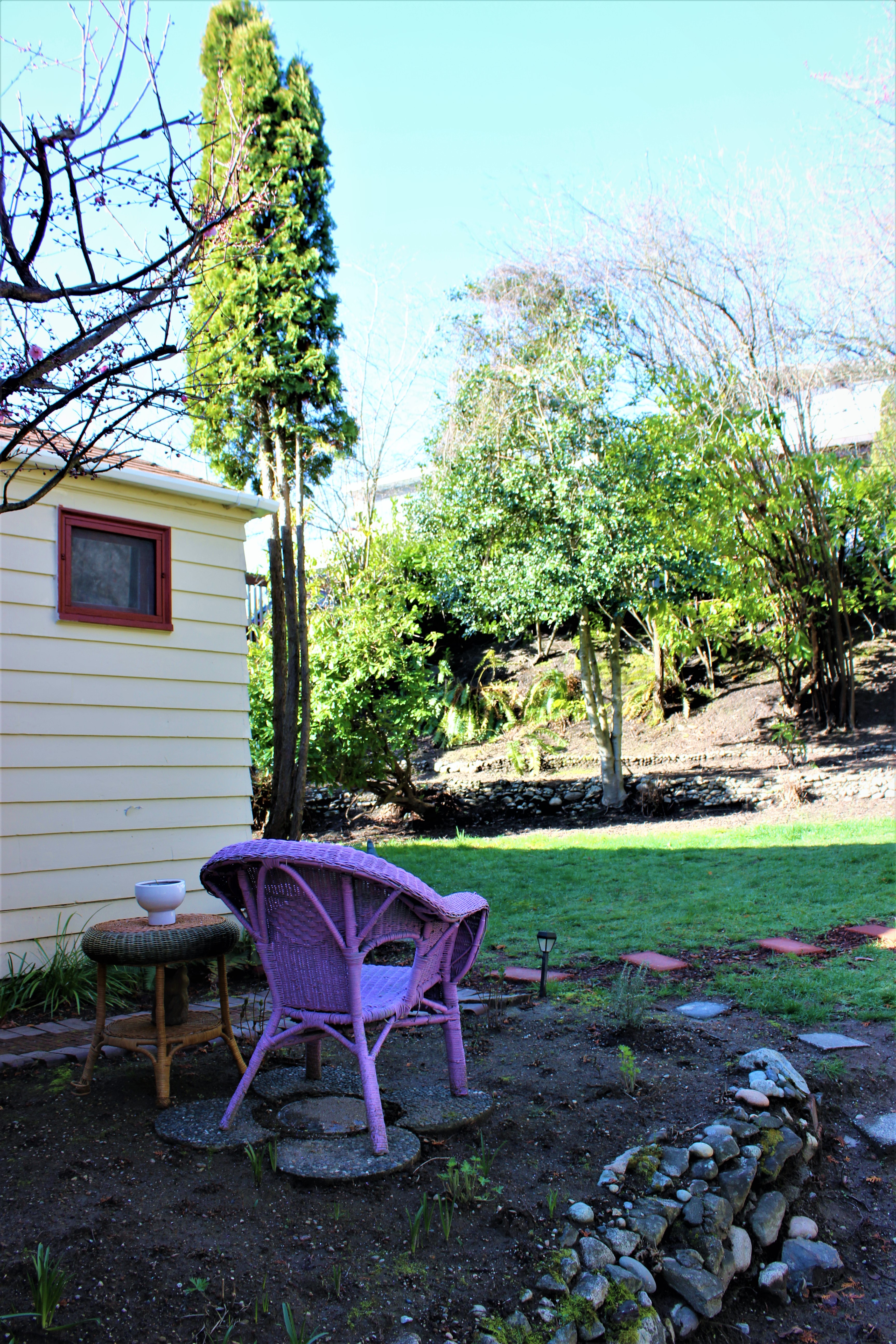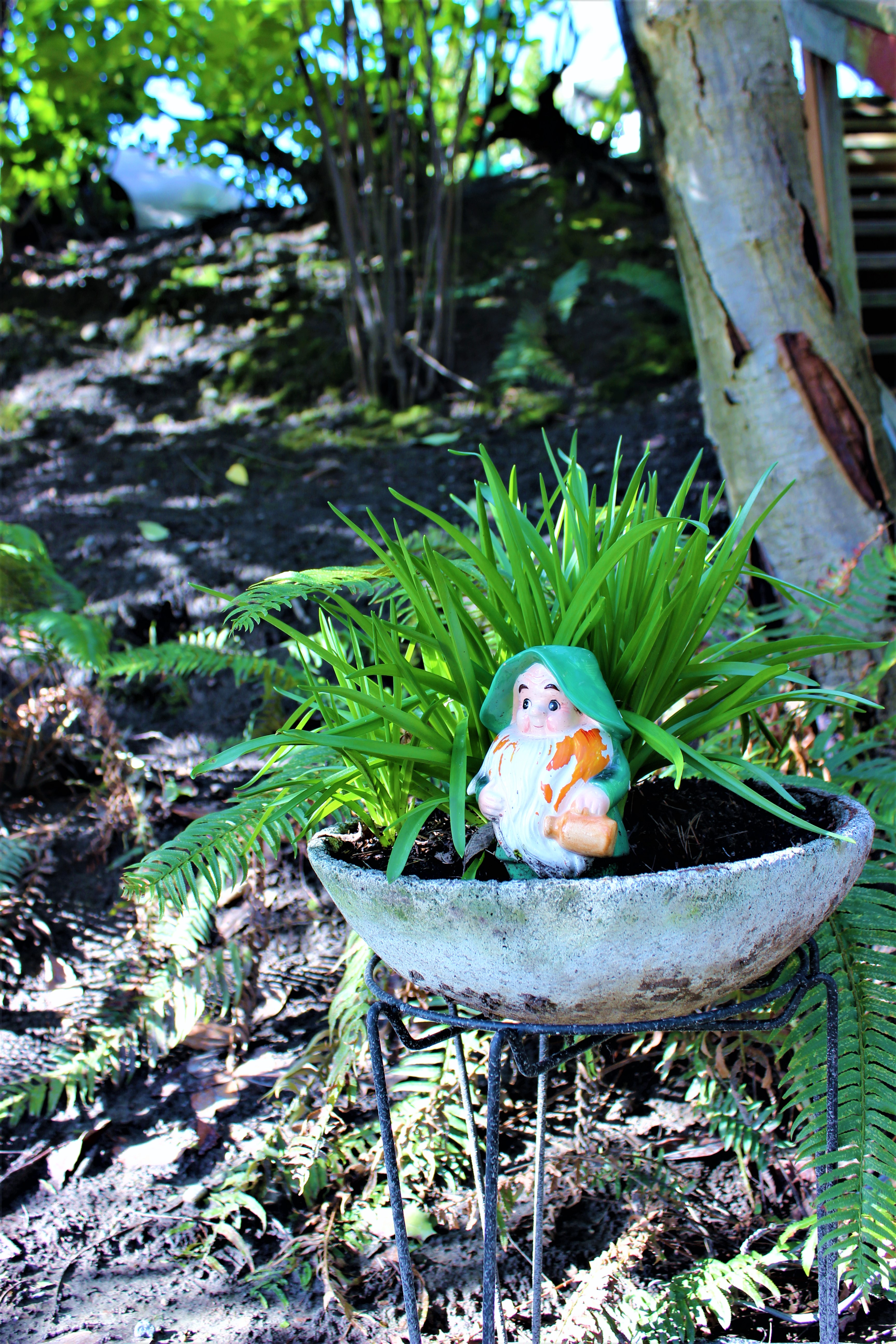The dead man’s garlic hung from the antler rack of the deer I killed when I was sixteen—a subtle homage to southern rites of passage adorning my laundry room. Soiled, damp roots dripped lazily from the fragrant, amorphous white bulb, the long green stalk yellowing at the top. Once dried, the roots and stalk will be trimmed off, a few cloves set aside for re-planting, and the rest stored—a humble beginning to my fall larder.
Around the time I was filing divorce paperwork last year, the man had plunked a garlic clove into the pot’s clayey, rock-filled soil; nine or so months later, he was dead, with scavengers like me rummaging through his home and expansive, overgrown yard.
Tucked within a matted mess of domestic detritus and weeds beneath the rotting, listing front deck, a brown ceramic bowl had caught my eye. Caked in dirt with an interior white glaze, the piece hadn’t been used for years, at least not as a bowl. I flipped it over and ran my fingers along the bottom inscription, the potter’s name, “Michael.” As I pushed further into the sagging cabin, I recognized nothing resembling a potter’s supplies; even still, I liked to think of it as Michael’s home.
Putting a name to a place reminds me of the life spent stewarding it. It translates to self-governed territory—a place all our own.
And there, as I peered over the hilly property extending down into a thick tree line, a distant memory replayed in my mind, something that I’d always remembered, but was never sure of why.
***
My paternal grandfather, whom my sister and I called Pop-Pop, had died and we were back in the Poconos, sorting through the home he, my grandmother—Mom-Mau—and our father had built. Having faced the hard reality that she wasn’t well enough to live alone in the mountains, Mom-Mau had reluctantly agreed to sell and move with us to Alabama. We kept only what we could fit into two cars; everything else was to be sold with the house.
Our parents had instructed us to comb through every closet and box; children of the Depression, our grandparents had squirreled away rolls of cash, many locations of which my grandmother had long forgotten. I rolled back one of the blond hallway closet doors and thumbed through a line of Pop-Pop’s clothes, most of which were nearly pristine plaid dress shirts and pants from the 70s. Never a clotheshorse, he was most comfortable in a pair of paint-spattered overalls—the knees faded and frayed from repeated wear—and a V-neck Sears tee shirt, rounded out with a pair of off-brand Velcro shoes. I reached inside each pocket, and passed on to the next; with each article I shoved behind me, a waft of Jade East writhed in my nostrils, and I could almost hear his signature cackle drifting in from the living room’s squeaky, threadbare sofa, entreating us to pull his finger.
Nearing the end of the line, I unclasped a buttoned pocket, reached inside, and pulled out a few neatly folded twenty-dollar bills. I got up and wandered into the kitchen where my mother stood reviewing cabinet contents, wrapping particular items in newspaper. I handed her the bills and she put them in a shoebox, which held a couple wads of other found money, along with loose change that was to be rolled. I surveyed the kitchen walls, and walked over to the sink, looking down through a cutout into the bar area where we used to place Yahtzee and cards. Above it hung a tiny painted skillet that read “Mary’s kitchen.” I took it down and handed it to my mother.
“Look, we can hang this up in our kitchen.”
She looked down, considered it momentarily.
“Absolutely not.”
Stunned by her forcefulness, I resolved then and there—as the laminate countertop as my witness—to save everything. From various vantage points around the house, I watched every trip my parents made to the curb with armloads of filled boxes scheduled to be picked up, and snuck out soon thereafter, pilfering little keepsakes and squirreling them into my bag along with other objects from around the house. Within thirty minutes, my small bag brimmed with tchotchkes, things only a child would take: a ceramic cowboy boot; hand-painted owl and quail lawn ornaments; tiny curios from Japan that’d filled the large front picture window; Pop-Pop’s empty cologne bottles; his Velcro shoes; his cufflink case filled with old watch faces, mismatched cufflinks, and wrapped razor blades; a Hull planter unearthed in the backyard; and a shoebox filled with ashtrays and defunct cigarette lighters. I wanted it all—feeling a growing dread that leaving one little scrap of their lives would mean we were leaving them entirely.
With a dollop of magical thinking, I assumed I could shove every piece of their material lives into a tiny knapsack turned bottomless magic hat. But soon after I shoved a tripodal, barrel-shaped magazine rack into the back of our van, I realized that we were already at capacity. I sat in the back room—my room when Laura and I visited—and stared at the dark mahogany-stained midcentury furniture with triangular knobs, the largely empty chests, and mourned the imminent loss of it all.
The clinking of glassware being boxed up in the kitchen filtered down the carpeted hallway, and I stared at the slim, portable television sitting atop a cart at the foot of the bed. Even though the television only played in black and white, I’d watch “I Love Lucy” and other such shows before going to bed, thinking how luxurious it was to have a television in the bedroom. I flipped the knob over, and jumped when something in the back panel popped, a thin plume of smoke billowing out of the display.
Moments later, parental olfactory senses kicked in, and my mother called back from the living room.
“Is something on fire back there?”
“The television just exploded.”
“Well, great. Unplug it and throw it out in the garbage.”
I watched the smoke for a minute, and then carted the television outside, tossing it into a box of miscellaneous, broken household items.
By the following morning, only a few curbside boxes remained—the rest having been tossed into the backs of laden station wagons and battered pickups.
As we backed out of the driveway for the last time, I pulled off the house sign; years later, I realized that, in a literal sign of his frugality, Pop-Pop had opted to flip the number 2s to make 7s and added a tail to a P to make an R, rather than buy the additional letter and numbers.
Through the rain-streaked car windows, I looked at the remaining sagging boxes, and the house. I couldn’t save it all; I couldn’t save the house where we had so many memories. All of it would be entering a new chapter without us, with new authors rewriting the future.
***
The wind blew up the hill where I stood, dislodging faded chip bags that’d been snagged within the bramble below. Behind me, one of the estate sale coordinators began boxing up unsold items, and bagging up the irredeemable, battered bits. I stooped and plucked the garlic-filled planter out of the ground, rocking it side-to-side until it dislodged, worms and centipedes squirming in the damp, grassless vacancy beneath.
I looked back up at the sagging cabin, assured it’d be razed within the month. Beside it sat my small pile of items—mostly planters, along with a Fire King milk glass mug, and Michael’s bowl. Together, it’d all become written into the story of Gay Gardens—from the ending of this quaint hideaway to the beginning of mine, from being saved from the dump to helping save a dump.
It’s through the process of trying to save Gay Gardens—or at least mapping my chapter onto it—that imbues the unimposing, rotting cottage with significance. And by using items that’d once helped revive other such oases, I gain a greater appreciation for the time, work, and energy expended in making a house a home—something personal, captivating. A refuge.
In my rear-view mirror, Michael’s cabin faded from view, and I noticed before I rounded the bend that a line of caution tape was being pulled across the driveway. As I do with all estate sales, I went to Michael’s to feel the stories, to suss them out from the piles of stuff, like a psychic conjuring spirits from a crystal ball; to wonder about the people before me; to use it as an exercise in mindfulness, of recognizing that, some day, something similar will happen with the things I’ve reclaimed from the darkening corners of history, rescued from the trashcan’s precipice—and have new life breathed into them as the light of another life in the world flickers out.
Back home, I cleaned up my finds, and sought out Pop-Pop’s cufflink box. Opening the worn, leather case, I smiled at the hodgepodge of contents—recalling the ubiquity of JFK’s countenance gracing nearly every room of their home.
I shuffled around the cufflinks and tie clips, and made mental notes to actually use them down the line. An unopened red box of Durex razor blades sat in one corner, and for kicks, I opened it to see if they’d actually fit my Merkur. Atop my bathroom counter, I unscrewed the razor and loaded in a blade, tightening the housing until the old blade was tightly sandwiched. With my shaving brush in hand, I coated my stubble, recalling how I’d watched Pop-Pop do the same before heading to the American Legion for drinks—always wondering what it’d be like to have a beard. As I ran the razor across my chin and up my cheeks, I quietly hummed one of the television jingles he’d always burst into—usually after returning from the Legion.
We feed our doggy Thrivo,
He’s very much alive-o,
Full of pep and vim!
If you want a peppy pup,
You better hurry up,
Buy Thrivo for him!
***
Each of my mini adventures reminds me that we have one shot, that we’re each but one grain of sand passing through the hourglass of the cosmos. And as crushing as that realization can sometimes be, I also use it as mental fuel to drive my intent to craft a life that’s perfectly imperfect: where viney Pothos leaves silently creep across paint-chipped, weathered surfaces; where Mom-Mau’s hand-knitted blankets hold shelf space, their fibers worn, the folds hole-pocked; where geraniums offer up their peppery fragrance in the rising heat, their leaves arcing toward the light; where wavy glass panes keep the rising damp at bay for another day; where rhododendrons heave upward, through cracked, hardened earth, bursting into the world’s bright days with fluorescent green leaves.
Where the home I’ve made sits perfectly silent, tended—its cracked-framed windows opened, the sounds of me rooting in the garden drifting up into the outermost rooms, leaving the interior spaces silent, still: waiting to fill with laughter and life.


